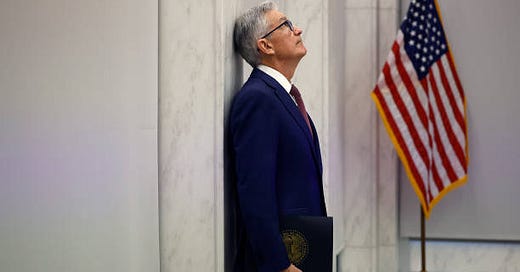When the Bank Stops Believing in Your Zip Code
Jerome Powell just confirmed that some places in America are becoming uninsurable.
Jerome Powell said it plainly.
“There are going to be regions of the country where you can’t get a mortgage.”
He said it in passing, during testimony to the Senate Banking Committee. Not a crisis briefing. Not a headline-grabbing address. Just another day in the soft apocalypse.
The context was climate risk. Fires. Floods. Coastal exposure. Insurers pulling out. Banks tightening standards. A landscape quietly shifting from insured to uninsurable. Mortgageable to unmortgageable. Livable to less so.
But the thing that lingered wasn’t the forecast. It was the tone. Flat. Almost administrative.
Like Powell wasn’t describing a future catastrophe — just narrating a change in policy.
And maybe that’s the deeper story.
Not that the climate is changing.
But that the institutions have already adapted.
The American mortgage is more than a loan.
It’s a belief system.
We don’t just buy homes with it. We build entire life scripts. You grow up, save up, settle down, build equity, send your kids to school based on your ZIP code, retire with appreciation. It’s not just how we live. It’s how we feel real. Anchored. Adult.
The 30-year fixed mortgage is a civic myth wrapped in a financial product. Stability, security, future orientation — all bundled and amortized into a monthly payment. And for decades, it worked. Not for everyone, not fairly, but reliably.
Until the models broke.
Now, the spreadsheet whispers what the moral imagination won’t say out loud:
There are places we will stop believing in.
It won’t feel like collapse.
It will feel like underwriting.
One year, your insurance premium doubles.
The next, your provider exits the state.
The following year, your loan officer says the risk model doesn’t clear.
No drama. No speech. Just silence where opportunity used to be.
And that silence will not be evenly distributed. It will fall first on fire-prone counties in California. Floodplains in Florida. Hurricane corridors in the Gulf. Not because they’re poor or redlined — though many are — but because their climate risk doesn’t pencil out.
That’s the cruelty of the new logic. It doesn’t need ideology.
Just math.
And as the math tightens, the exits begin.
Insurance firms pull out. Reinsurers quietly recalibrate. Banks stop offering 30-year products and switch to adjustable rates. Fannie and Freddie update their guidance. A million small rational decisions, each defensible on its own, but devastating in aggregate.
Until one day, a whole region becomes a financial ghost town. Still populated. Still struggling. But no longer investable.
We’ve seen this movie before.
It was called redlining.
Then, it was maps drawn with race in mind. Now, it’s risk models drawn with fire and flood.
But the outcome rhymes. A zone where capital refuses to flow.
Where credit dries up and reality decays in place.
This time, the exclusion won’t be limited to urban Black neighborhoods. It will hit the wildland-urban interface. The coastal dream homes. The inland valleys. Even the suburbs that once promised safety and sameness. Because climate doesn’t segregate neatly. It rolls.
The hard part is that it won’t feel unjust. It’ll feel like policy.
Which makes it harder to fight, harder to grieve.
No villain. No smoking gun. Just a system refusing to extend itself.
What Powell’s quiet warning reveals is not a political failure.
It’s a metaphysical one.
We believed risk could be priced. Future could be discounted. Catastrophe could be diversified.
We believed that a home, once financed, meant permanence.
But the institutions don’t believe that anymore.
They’ve adjusted. Quietly. Technocratically. Rationally.
The myth is breaking before the world does.
And when we look back, we may not remember the fires or the floods as the moment things changed.
We may remember the day a place couldn’t get a mortgage.
That was the day the country decided it no longer believed in that place.
The mortgage was never just a contract.
It was a vote of confidence.
And when confidence leaves, all that’s left is property without promise.
A house on paper. A future without a lender.





